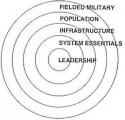I've argued elsewhere that our objective isn't feasible. I've suggested the best that might be achieved is a state like Pakistan which only has effective control over 1/3 of its supposedly sovereign territory with the remainder being run more like a colony than anything else. I also tend to think we should be trying to coopt the opium trade instead of trying to get rid of it - at least for the time being. There are more important things to accomplish than moralizing about opium, IMO. Opium production is a long-term problem that can't be solved until other things happen first.Entrophy, no one in their right mind would argue your points on Afghan's history. That isn't the issue, the issue is that our objective is to establish a viable Nation-State, and if it can't control the economy (at least more than it influences now), is our objective feasible?
I don't think state control of the economy is at all necessary. Just look at the early USA - the economy was almost completely controlled at the local level and the further in the boonies you got, the more local the control. For a largely agrarian country like Afghanistan with a diverse ethnic character, I don't think centralized control of the economy is either desirable or possible, particularly given the difficulties that already exist attempting to get some kind of centralized political control/authority.
And one can consider the opposite case. I've been reading a bit about the Baluchs recently. It turns out that pretty much all of the major economic activity that takes place in the Baluch areas of Pakistan are controlled by the central government (resource extraction, major construction projects, etc.). Even workers are imported. Not surprisingly, this activity benefits the punjab majority next door almost exclusively and provides very little to the Baluchs. Not a good situation and some believe another major Baluch insurrection is only a matter of time.
In this part of the world, too much state control is often a bad thing because the state is rarely fair. The state favors certain groups at the expense of others. The Baluchs are only one example. In the case of a strong Afghan central government I don't think the result would be much different.
Just my 2 cents.













Bookmarks